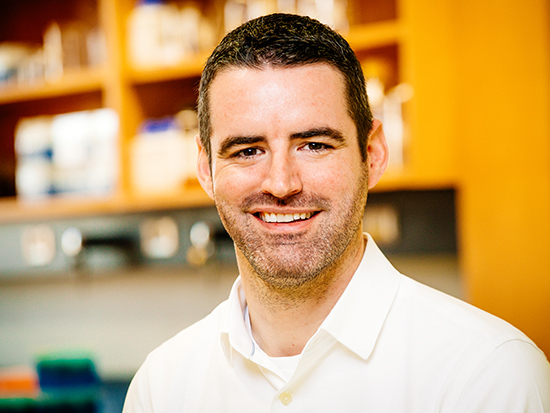 Newly funded research by the McKnight Foundation will study whether genetic links contribute to addiction and relapse.Jeremy Day, Ph.D., associate professor in the Department of Neurobiology, Heersink School of Medicine at the University of Alabama at Birmingham, in concert with Ian Maze, Ph.D., director of the Center for Neural Epigenome Engineering, Icahn School of Medicine at Mount Sinai, and an investigator with the Howard Hughes Medical Institute, has received a 2022 Neurobiology of Brain Disorders Award from the McKnight Endowment Fund for Neuroscience.
Newly funded research by the McKnight Foundation will study whether genetic links contribute to addiction and relapse.Jeremy Day, Ph.D., associate professor in the Department of Neurobiology, Heersink School of Medicine at the University of Alabama at Birmingham, in concert with Ian Maze, Ph.D., director of the Center for Neural Epigenome Engineering, Icahn School of Medicine at Mount Sinai, and an investigator with the Howard Hughes Medical Institute, has received a 2022 Neurobiology of Brain Disorders Award from the McKnight Endowment Fund for Neuroscience.
Day and Maze lead one of four projects selected for funding in 2022. The awards total $1.2 million, with each project receiving $300,000 over three years. Their project involves researching the epigenetic underpinnings of addiction to identify neural ensembles that have been hijacked by drug exposures, thereby disposing individuals to relapse.
“It’s exciting to have the opportunity to select some of the nation’s leading neuroscientists and to support their trailblazing research,” said Ming Guo, M.D., Ph.D., chair of the award committee and director of the Aging Center at UCLA. “This year’s awardees are conducting research into disease and conditions that affect millions of patients. Their work focuses on breathing problems and brain circuit, drug addiction, the gut-brain interactions underlying anorexia, and hedonic eating behavior and obesity. By understanding the neurobiology of diseases, we open the door to new ways to prevent and treat these brain disorders.”
The awards are inspired by the interests of William L. McKnight, who founded The McKnight Foundation in 1953 and wanted to support research on brain disease. His daughter, Virginia McKnight Binger, and The McKnight Foundation board established the McKnight neuroscience program in his honor in 1977.
Day and Maze aim to research addiction at a new level — drilling down to the epigenetic effects of drug use on specific cells at a single-cell level, and how these may predispose an individual to a relapse. While there has been significant research into understanding and treating addiction, 60 percent of those treated will suffer a relapse. In fact, the craving for drugs may actually increase over time, incubating in those who have been addicted even without further drug exposures.
 Jeremy Day, Ph.D., UAB Department of NeurobiologyDay and Maze suggest that drugs can hijack genetic regulatory elements known as enhancers, which when activated cause certain genes to be expressed in brain cells that motivate the subject to seek out these drugs. They have designed a project to identify these enhancers in a cell-type-specific fashion that are activated by cocaine — a well understood and researched stimulant — and then create and insert viral vectors into cells that will become active only in the presence of that enhancer.
Jeremy Day, Ph.D., UAB Department of NeurobiologyDay and Maze suggest that drugs can hijack genetic regulatory elements known as enhancers, which when activated cause certain genes to be expressed in brain cells that motivate the subject to seek out these drugs. They have designed a project to identify these enhancers in a cell-type-specific fashion that are activated by cocaine — a well understood and researched stimulant — and then create and insert viral vectors into cells that will become active only in the presence of that enhancer.
Their work builds on recent advances in the ability to target individual cells and small groups of cells, rather than entire populations of cells or cell types as has been the focus of earlier research. Now that it is possible to focus on the role specific cells play, the hope is that better treatments may be developed that address the genetic roots of addiction and relapse, and without the negative side effects of manipulating larger, less targeted populations of brain cells.
The McKnight Endowment Fund for Neuroscience is an independent organization funded solely by The McKnight Foundation of Minneapolis, Minnesota, and led by a board of prominent neuroscientists from around the country. The McKnight Foundation has supported neuroscience research since 1977. The Foundation established the Endowment Fund in 1986 to carry out one of the intentions of founder William L. McKnight (1887-1978), one of the early leaders of the 3M Company.
The Endowment Fund makes three types of awards each year. In addition to the Neurobiology of Brain Disorders Awards, they are the McKnight Technological Innovations in Neuroscience Awards, providing seed money to develop technical inventions to advance brain research; and the McKnight Scholar Awards, supporting neuroscientists in the early stages of their research careers.